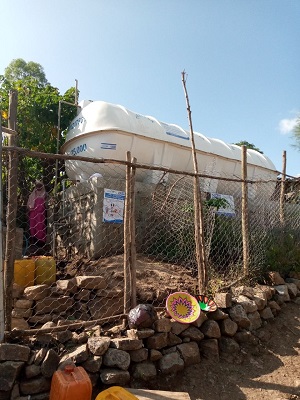
The political reform, that took place in mid-2018 in Ethiopia, has brought various positive outcomes to the country. Nevertheless, those who oppose the reform attempt to destabilize the country and displaced many people from their villages. Currently, with the commitment and direction of the government, many of the internally displaced people (IDPs) return to their place and start leading a normal life.
However, the displaced people return to their villages and start to live a normal life, many of these internally displaced persons face serious challenges which affect their well-being. Especially, the damage to drinking water, sanitation, and hygiene facilities become a great challenge for both the people who have returned to their villages and are located in IDP camps in Oromo Special and North Shewa zones in the Amhara State.
Accordingly, a Non-Governmental Organization called Plan International Ethiopia has handed over drinking water, sanitation, and hygiene facilities that benefit over 170 thousand people in the Oromo Special and North Shewa zones in the Amhara Region.
Executing various community-centered projects like drinking water supply, education, health, and other related societal services is significantly useful in improving the lives of many, so stated Plan International.
Speaking at a ceremony organized to hand over a range of projects to the community in the Oromo Special and North Shewa zones in the Amhara State, Plan International Ethiopia Country Office Wash Project Manager Wendosen Admasu said that the facilities are built in 8 Woredas with the aim to benefit society who were displaced and affected by recurrent conflict in the region.
According to Wendosen, Plan International Ethiopia is working on drinking water, sanitation, and hygiene facilities that assist the communities. The facilities which are handed over to the communities are clean water supply, toilets, and showers that are built in Ataye city and Debre Berhan city displaced camps.
The rehabilitation work includes 12 kilometers of a clean water pipeline that covers three kebeles and expands over 16 water points, and reservoirs in Ataye city, he added.
Debre Berhan city IDP camps Health Officer Inidabere Sewamne said the water facilities, toilets, solid and liquid waste disposal, capacity building, and awareness training directly benefit and support the health sector activities in the camp.
Tadele Gedamu a Health Officer noted that the water, sanitation, and hygiene facilities as well as waste disposal management training directly benefit not only the IDPs but also the health sectors in the city.
Especially, the toilets that are built in the IDP camp prevent infectious and communicable diseases by avoiding open defecation. The waste disposal facilities help to prevent major outbreaks such as Cholera in the IDP during winter seasons. He further requested the organization to continue providing the region with clean water access, and sanitation and hygiene services.
The 65 years old Ataye city resident Mr. Zeyde Hamade remarked that the conflict worsens the severe water shortage problems that existed in the city. The water shortages reached a peak due to the damage to the water lines in the ongoing war.
The place where we fetch water is very far away from our residence and are forced to carry jars and water containers for many kilo metros. Because paying to use donkeys or camels for fetching water is very expensive since the people are highly affected by the conflicts. Hence, we were subjected to unnecessary costs.
The new water points with water reservoirs containers along with the service it provides, help children to go to school. It also gives relief to women not to be harmed by carrying water containers and jars, he stated.
According to Ataye City Mayor Asfaw Derbe, Plan International is a model for other NGOs by building drinking water, hygiene, and sanitation facilities for the communities within six months. These moves and activities should be also repeated in other developmental projects in the region in general and Ataye city in particular.
BY EPHREM ANDARGACHEW
The Ethiopian Herald November 27/2022




